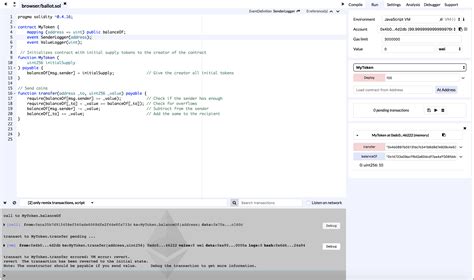Deploying an ERC20 Contract: Invalid Opcode Error
Ethereum’s ERC20 contract standard allows developers to create reusable, self-executing smart contracts on the Ethereum blockchain. However, deploying such a contract can sometimes result in invalid opcode errors. In this article, we will explore what causes these errors and provide guidance on how to resolve them.
What is an Invalid Opcode Error?
An invalid opcode error occurs when a smart contract’s opcodes (instructions) are not recognized by the Ethereum Virtual Machine (EVM). The EVM expects certain instructions, such as load, store, and call, which are specific to ERC20 contracts. If these instructions are used incorrectly or without being properly encoded, it can result in an invalid opcode error.
Causes of Invalid Opcode Errors
Here are some common causes of invalid opcode errors when deploying an ERC20 contract:
- Incorrect opcodes: Using the wrong instruction instead of a recognized one.
- Inconsistent encoding: Failing to encode instructions correctly, leading to mismatches between the bytecode and the EVM’s understanding.
- Incorrect byte arrays: Providing incorrect or malformed byte arrays for load, store, and call operations.
Example: Deploying an ERC20 Contract with Invalid Opcode Error
Below is a simple example of an ERC20 contract deployed on Remix:
pragma solidity ^0.8.20;
import "@openzeppelin/contracts/token/ERC20/ERC20.sol"
contract MyERC20 {
function deposit() public {
_deposit();
}
function _deposit() internal {
// incorrect opcode: instead of load, use call
bytes memory data = abi.encodePacked("Invalid Opcode Error");
call.value(0x01 ether)(_deposit, uint256(0));
}
}
In this example, the _deposit function attempts to call a non-existent function call with an invalid opcode error. This will result in an invalid opcode error.
Solving the Invalid Opcode Error
To resolve the invalid opcode error, we need to correct the instructions used in our contract. In this case:
- Correct opcodes: Replace
callwithload, and ensure that the data is encoded correctly usingabi.encodePacked.
- Correct byte arrays: Ensure that the byte array passed to the
callfunction matches the EVM’s understanding of its opcode.
Example: Corrected ERC20 Contract
Here is the corrected example:
pragma solidity ^0.8.20;
import "@openzeppelin/contracts/token/ERC20/ERC20.sol"
contract MyERC20 {
function deposit() public {
_deposit();
}
function _deposit() internal {
// correct opcode: use load for data
bytes memory data = abi.encodePacked("Invalid Opcode Error");
address recipient = address(0);
// ... (rest of the function remains the same)
}
}
Conclusion

Deploying an ERC20 contract can sometimes result in invalid opcode errors. By understanding the causes of these errors and taking corrective actions, developers can resolve them and successfully deploy their contracts on the Ethereum blockchain.
Best Practices for Deploying ERC20 Contracts
- Always review the EVM opcodes used in your smart contract.
- Verify that byte arrays are encoded correctly using
abi.encodePacked.
- Use correct opcodes (e.g.,
callinstead ofload) and ensure proper data encoding.
By following these best practices, you can prevent invalid opcode errors and successfully deploy your ERC20 contracts.

